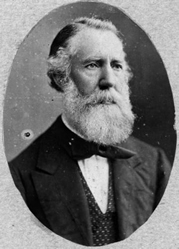Richard Bingham Sheridan
| Richard Sheridan | |
|---|---|
 | |
| Member of the Queensland Legislative Assembly for Maryborough | |
|
In office 17 October 1883 – 5 May 1888 | |
| Preceded by | Henry King |
| Succeeded by | Richard Hyne |
| Personal details | |
| Born |
Richard Bingham Sheridan 1 August 1822 Mayo, Ireland |
| Died |
8 June 1897 (aged 74) Manly, New South Wales, Australia |
| Resting place | Waverley Cemetery |
| Nationality | Irish |
| Spouse(s) | Adele Eulalie Masse (m.1845 d.1904) |
| Occupation | Public servant |
| Religion | Roman Catholic |
Richard Bingham Sheridan (1 August 1822 – 8 June 1897), was a Queensland public servant, liberal-oriented Member of the Legislative Assembly of Queensland and government minister (minister without portfolio 1883-85 and later Post Master General in 1885).[1]
Sheridan was born at Castlebar, County Mayo Ireland, tge son of Henry S. Sheridan and his wife Margaret, née Martin. He arrived in New South Wales in 1842 and was initially employed near Twofold Bay, where he had the experience of being, on his own account, 'one of the first white men ever seen among the wild tribes'. Subsequently, he was until 1844 employed as a property manager for Captain William Oldrey of Broulee. He married on 18 November 1845, in Sydney, to Adele Eulalie Masse, a native of Mauritius. Sheridan retired to Brisbane but moved to Sydney in 1897, where he died at Manly on 8 June and was buried in Waverley cemetery in accordance with his Catholic faith.[2][1]
Sheridan subsequently joined the Customs Department in Sydney in February 1846 but his illness made him be eventually transferred to Moreton Bay (Brisbane) in February 1853, where on 31 May, he became a member of the Steam Navigation Board. He later moved north to take op position as a sub-collector of customs at Maryborough on 10 December 1859 and subsequently as a Water Police Magistrate and Immigration Agent. He thus held several key positions in the Wide Bay and Maryborough area in the period from 1859 to his retirement in about 1890.[1] Sheridan was also a trustee and a member of the board of management of the Brisbane Botanic Gardens.[3]
Sheridan was respected for his integrity and deep sense of fairness and humanity, and as such, he remained throughout his life a true pioneer of compassion in regards to the rights of Aboriginal people and always keenly alert to the shady sides of the infamous Melanesian labour trade. He thus protested in public against the Native Police system he would later raise his voice in defence of the rights of Melanesian labourers. In November 1873, he strongly criticised Maryborough hospital for refusing the treatment to a dying Aboriginal.[4]
References
- 1 2 3 Jones, Dorothy. "Sheridan, Richard Bingham (1822–1897)". Australian Dictionary of Biography. Canberra: Australian National University. Retrieved 15 August 2013.
- ↑ Obituary, Brisbane Courier 9 Jun 1897, page 7f; Queenslander 3 Sep 1904, page 9b;
- ↑ Mennell, Philip (1892). "
 Sheridan, Lieut.-Col. Richard Bingham". The Dictionary of Australasian Biography. London: Hutchinson & Co. Wikisource
Sheridan, Lieut.-Col. Richard Bingham". The Dictionary of Australasian Biography. London: Hutchinson & Co. Wikisource - ↑ Evidence to the Select Committee into the Native Police Force May 1861; Maryborough Chronicle 5 Feb 1874, page 3a; Maryborough Chronicle 9 Dec & 16 Dec 1876, Extract from the evidence taken by the select committee on Polynesian labour Iⅈ Q 22 Jul 1876, page 6d; Gympie Times 6 Sep 1876, Editorial; Gympie Times on 7 & 17 Sep, and 7 Oct 1876, Articles on Sheridan and the Kanaka trade.
| Parliament of Queensland | ||
|---|---|---|
| Preceded by Henry King |
Member for Maryborough 1883–1888 |
Succeeded by Richard Hyne |